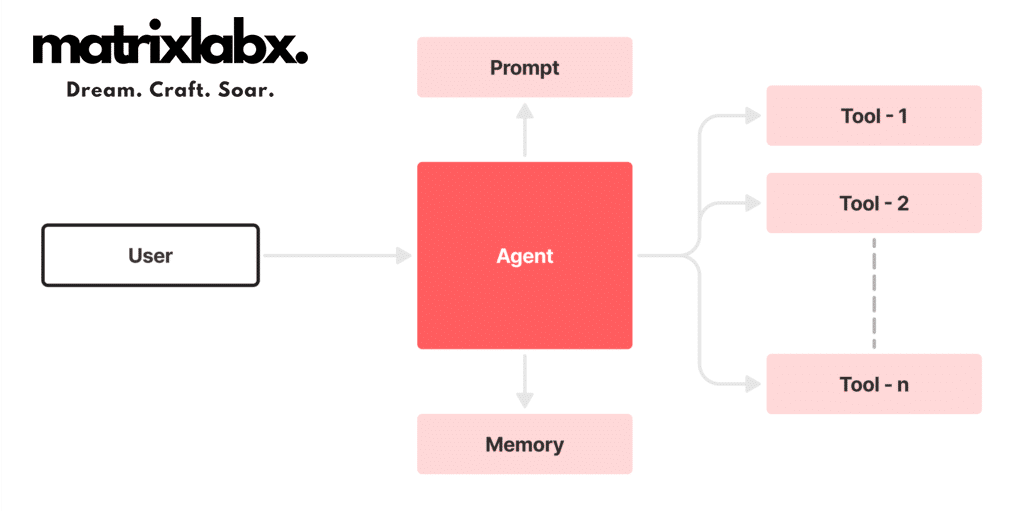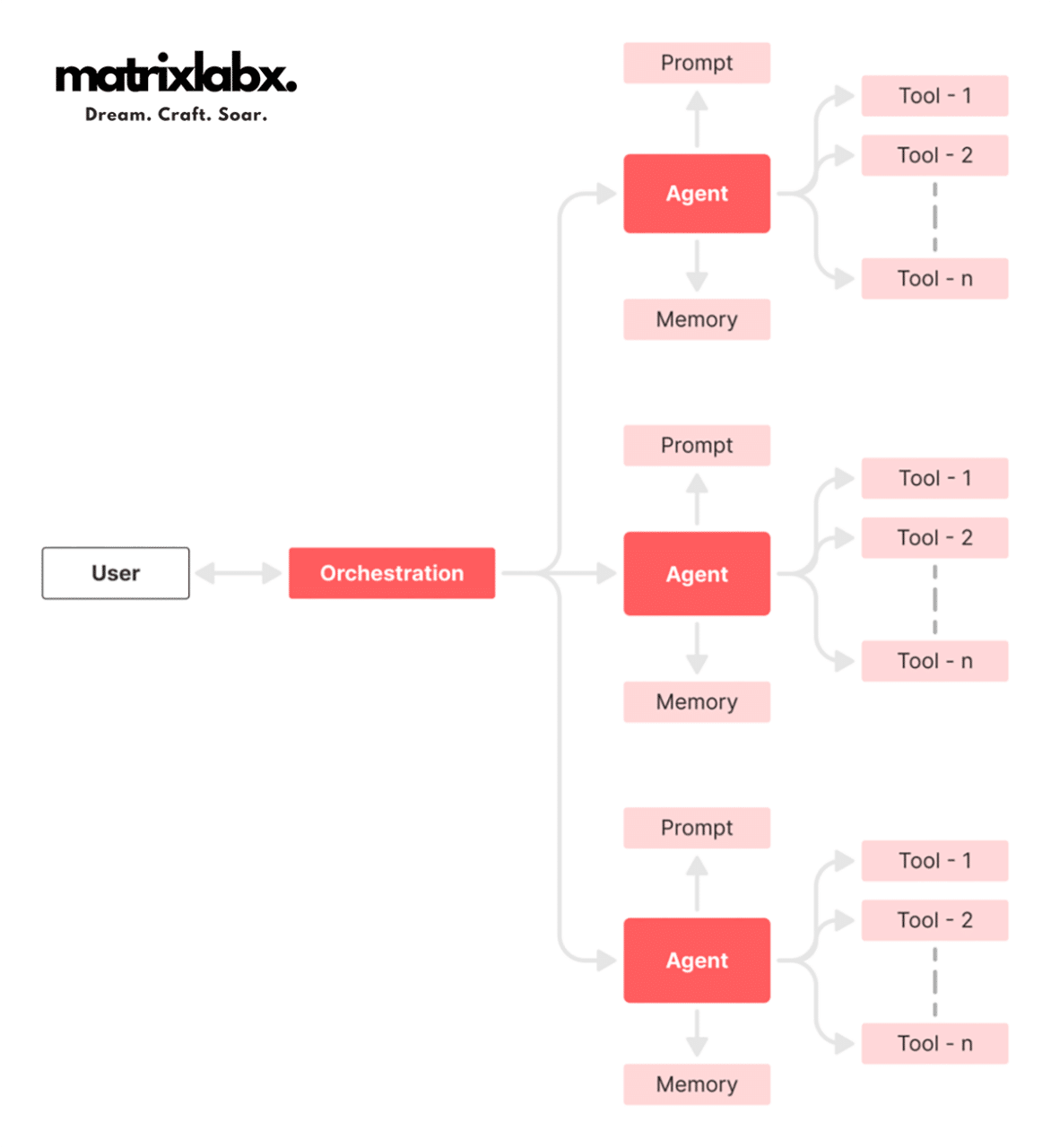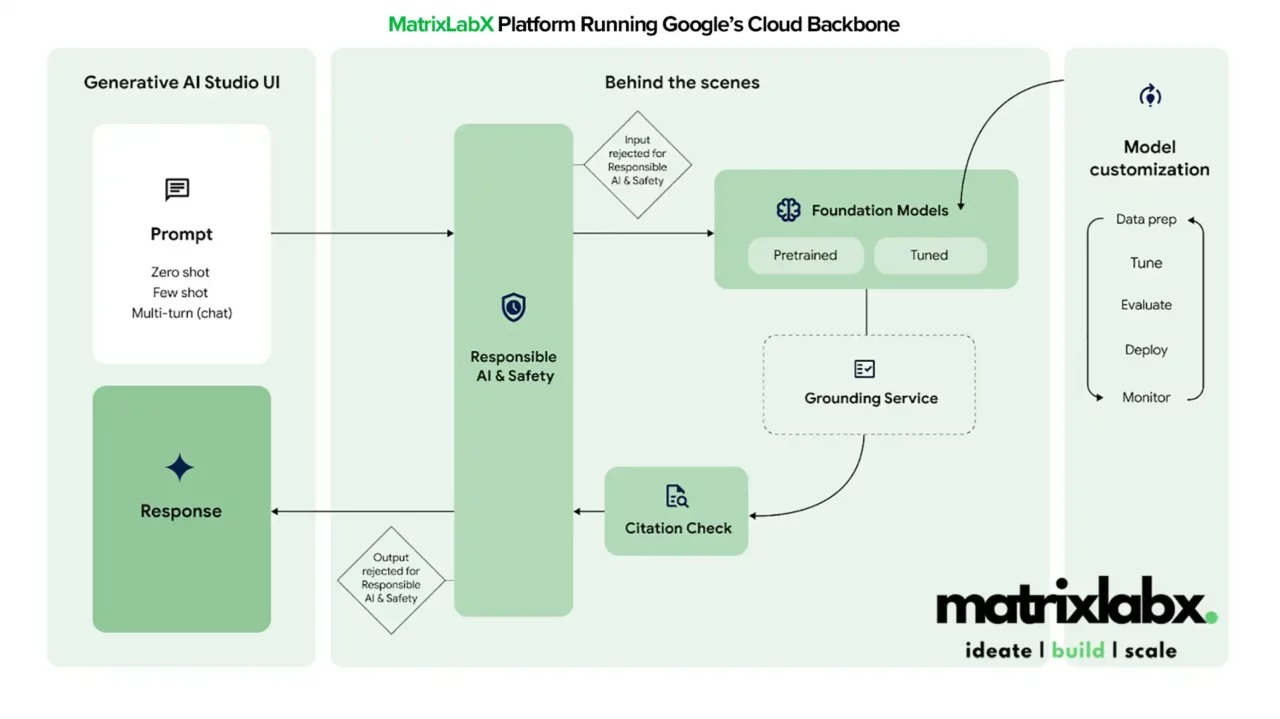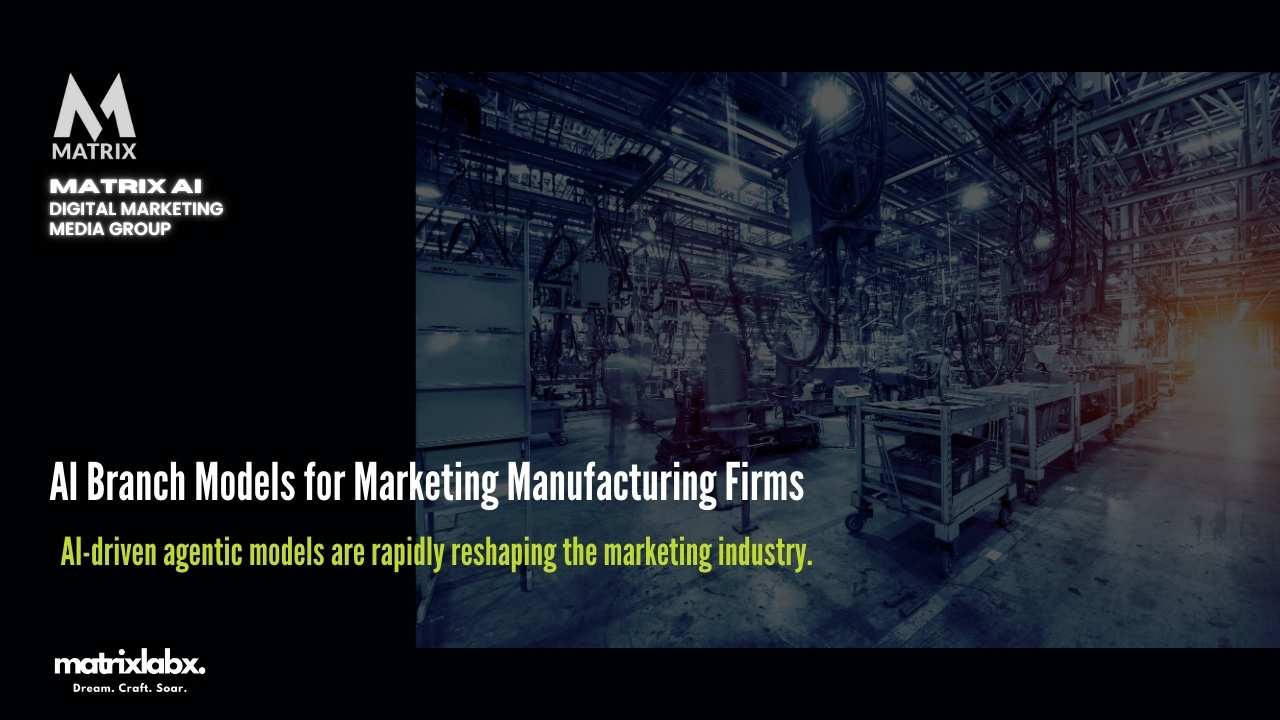AI Branch Models for Marketing Manufacturing Companies with AI Agentic Systems
Imagine a moment when AI surpasses human intelligence—an unstoppable cascade of self-improvement begins, and each iteration grows exponentially smarter. This acceleration pushes beyond the limits of your imagination, transforming our world instantly.
We stand on the brink of an unprecedented era when the lines between humans and machines blur into a singularity of unimaginable potential.
For marketers, this isn’t just a glimpse of the future—it’s a new playing field in which the rules of creativity, engagement, and connection are being rewritten. For us, it’s now.
Are you ready to seize this opportunity and lead your brand into the future?
1. Introduction: AI Branch Models for Marketing Manufacturing Firms

1.1 Overview of AI in Manufacturing Marketing
Artificial Intelligence (AI) is revolutionizing the marketing landscape across industries, and the manufacturing sector is no exception.
Traditionally, marketing in manufacturing was dominated by relationship-building and offline tactics. However, the complexity of the modern buyer’s journey and the vast amounts of available data mean that AI can drive more informed decisions, personalize engagement, and automate key processes.
Intelligence (AI) in marketing. AI’s ability to optimize processes, drive personalization, and harness data analytics has begun to redefine how manufacturers reach and engage their customers. Here’s a detailed analysis of the latest trends, technologies, and challenges shaping AI in manufacturing marketing, with insights that can serve as the foundation for a series of in-depth blog posts.
Latest Trends in AI for Manufacturing Marketing
- Hyper-Personalized Marketing: Manufacturers increasingly use AI to segment audiences and create personalized marketing experiences. AI algorithms analyze customer behavior and preferences to offer highly tailored content and solutions. According to a 2023 McKinsey report, companies that leverage AI for personalization have seen up to a 30% boost in customer engagement rates.
- Predictive Analytics: Powered by AI, it helps manufacturers anticipate customer needs and behaviors. AI algorithms can analyze historical data to predict future buying patterns, enabling more proactive marketing. For instance, a case study by Siemens showed that leveraging predictive analytics for customer insights helped them increase lead conversion by 25% in one year.
- Conversational AI and Chatbots: Conversational AI is gaining traction to enhance customer service and engagement in manufacturing. Using natural language processing (NLP), Chatbots assist customers in real-time, answering queries and helping guide decisions. Boston Dynamics reported that their AI-driven chatbots have reduced response times by 40% while maintaining high customer satisfaction.
- Automated Content Creation: Manufacturers are also utilizing AI to automate content production, allowing them to generate product descriptions, reports, and promotional materials quickly. AIContentPad, for instance, has been reported to decrease content production time by up to 50%, enhancing marketing agility and scalability.
- Augmented Reality (AR) & AI Integration: AI is driving the next wave of immersive experiences for potential customers through the integration of AR. This trend is seen in virtual factory tours, allowing potential buyers or investors to engage with a digital representation of production processes. Such technologies can enhance transparency and build trust with stakeholders.
AI Branch Models for B2B Technology by MatrixLabX
AI-first paradigm rapidly reshapes the industry, replacing outdated structures with agile, efficient, and scalable approaches.
Technologies Driving AI Adoption in Manufacturing Marketing
- Machine Learning (ML) Algorithms: Machine learning, a key subset of AI, allows for better predictive maintenance and customer engagement by identifying patterns in data that can predict equipment failures or consumer interest trends. Manufacturers use platforms like AWS and Microsoft Azure to implement machine learning solutions.
- Natural Language Processing (NLP): NLP facilitates better customer interactions by enabling AI systems to understand and generate human-like responses. NLP is used in automated customer support, sentiment analysis, and even translating technical jargon into customer-friendly language.
- IoT and AI Convergence: The convergence of Internet of Things (IoT) devices with AI is proving transformative. Data gathered from sensors in manufacturing systems provide insights into product performance, which can be leveraged for targeted marketing campaigns and customer education initiatives.
- Computer Vision: Manufacturers use computer vision, an AI technology that enables machines to interpret and make decisions based on visual data for quality control and marketing visuals. For example, a Ford case study demonstrated how computer vision enhanced campaign product imagery by analyzing and optimizing for the most visually appealing angles.
Challenges in AI Adoption for Manufacturing Marketing
- Data Quality and Integration Issues: Many manufacturers face challenges integrating data across different sources. AI relies heavily on clean, consistent, and relevant data. Fragmented legacy systems often lead to difficulties in harnessing AI’s full potential, impacting the efficacy of marketing campaigns.
- High Costs and ROI Concerns: Implementing AI technologies can be expensive, especially for small to medium-sized enterprises (SMEs). A report by Deloitte indicates that nearly 50% of manufacturing firms are hesitant to adopt AI due to concerns over high costs and uncertain ROI.
- Lack of Skilled Workforce: AI in manufacturing marketing requires specialized knowledge, and a talent gap exists. Manufacturers struggle to find personnel skilled in both AI and marketing strategies. Addressing this skills gap through reskilling programs or collaborations with educational institutions is essential for successful AI adoption.
- Ethical and Privacy Concerns: AI systems use large amounts of customer data, raising concerns about data security and privacy. Maintaining compliance with regulations like GDPR remains challenging, particularly for global manufacturers who must adhere to diverse data regulations.
AI-driven marketing tools help manufacturers navigate the intricate web of stakeholders, complex decision-making processes, and customization demands that characterize their industry.
1.2 The Role of AI Branch Models in Modern Marketing
AI Branch Models are among the latest innovations being leveraged to enhance marketing effectiveness.
Unlike traditional AI approaches that follow a single, linear flow, branch models are designed to adapt and evolve, allowing for diverse marketing paths that cater to different buyer personas and behaviors.
These branching models help marketers offer personalized experiences at scale, improving customer satisfaction and conversion rates.
1.3 Purpose of This Guide
This guide is intended to help marketing managers in manufacturing companies understand how AI Branch Models and AI-driven agents can be leveraged to drive greater efficiency, personalization, and ROI in their marketing strategies.
It provides an in-depth look at how these technologies work, their benefits, practical use cases, and actionable steps to get started.
2. Understanding AI Branch Models

2.1 What Are AI Branch Models?
AI Branch Models are sophisticated AI systems that create adaptable pathways for marketing interactions based on data-driven insights.
Instead of treating every potential customer similarly, these models create branches or decision points that adjust based on customer behavior, preferences, and interactions.
For instance, if a customer shows interest in a specific product, the model might offer additional information about that product or provide tailored promotions to move the prospect further along the sales funnel.
2.2 How AI Branch Models Differ from Traditional AI Approaches
Traditional AI approaches often involve static algorithms that operate within a linear decision-making framework.
These approaches can need more flexibility to adjust to individual customer journeys, particularly when dealing with complex sales processes like those in manufacturing.
On the other hand, AI Branch Models allow for non-linear, dynamic paths that adjust in real time.
This adaptability is crucial for manufacturing marketing, where buyers often have unique requirements and decision-making timelines.
2.3 Benefits of AI Branch Models in Marketing
AI Branch Models offer significant benefits for marketing, including:
- Personalized Marketing Journeys: Tailor interactions to individual prospects, ensuring relevance at every stage.
- Scalability: Automate complex marketing processes while maintaining personalization, enabling marketers to handle more leads without compromising quality.
- Precise Segmentation: Use data-driven insights to create segments that accurately reflect customer behaviors and needs, leading to more effective campaigns.
3. Marketing Challenges in the Manufacturing Industry
3.1 Complexity of Buyer Journeys
The buyer journey in the manufacturing industry is complex due to the involvement of multiple stakeholders.
Unlike consumer markets, where individual decision-makers are common, manufacturing purchases often require input from various roles, including engineers, procurement officers, and executives.
Each stakeholder has different priorities, and creating a cohesive marketing strategy that resonates with everyone involved is challenging.
3.2 High-value, Low-volume Sales Cycles
Manufacturing typically involves high-value sales with lower volume compared to other industries.
The extended sales cycle means marketers must nurture leads over long periods, requiring tailored content and consistent communication to keep prospects engaged.
AI Branch Models can help maintain engagement by delivering relevant content at each journey stage.
3.3 Need for Customization and Technical Knowledge
Manufacturers often must provide highly customized solutions, meaning marketing content must be technically accurate and deeply informative.
Understanding the specifics of a prospect’s needs and delivering tailored content can be challenging without the right tools.
AI Branch Models and AI-driven agents can help gather the necessary data to create hyper-specific messaging that addresses individual pain points.
4. AI-driven Agents: Revolutionizing Marketing Operations
4.1 What Are AI-driven Agents?
AI-driven agents are automated tools that perform specific marketing tasks based on pre-set criteria and data insights.
These agents can manage various activities, from lead nurturing and customer segmentation to personalized content distribution.
By automating repetitive tasks, AI agents free up marketing teams to focus on strategy and creativity.
4.2 Applications in Manufacturing Marketing
AI-driven agents can perform numerous functions in the context of manufacturing marketing, such as:
- Lead Nurturing: Sending personalized follow-up messages based on prospect behavior.
- Customer Segmentation: Analyzing data to group customers into relevant segments for targeted campaigns.
- Account-Based Marketing (ABM): Customizing outreach efforts to address the specific needs of high-value accounts.
4.3 Real-world Use Cases
Many manufacturing companies are already reaping the benefits of AI agents.
For instance, a metal fabrication company used AI-driven agents to segment leads based on website behavior, allowing more personalized follow-ups.
This approach increased lead conversion rates by 20%. Another company leveraged AI agents for ABM campaigns, sending tailored technical content to key decision-makers, resulting in improved engagement and faster deal closures.
5. Building AI Branch Models for Manufacturing Companies
5.1 Identifying Key Branches: Audience Segmentation
The first step in building AI Branch Models is effective audience segmentation.
In manufacturing, segments might be defined by industry verticals, specific product interests, or the role of the stakeholder within the buying process.
Understanding the unique pain points of each segment is crucial for creating effective branches.
5.2 Data Collection and Analysis
AI Branch Models rely on accurate data to make informed decisions. Data sources include CRM systems, website analytics, and industry-specific insights.
Manufacturers should ensure their data is organized and accessible to fuel these models effectively.
5.3 Customizing Marketing Funnels for Different Stakeholders
Manufacturing marketing funnels are complex due to multiple decision-makers. Using AI Branch Models, marketing teams can create separate funnels tailored for engineers, procurement officers, and C-suite executives, each addressing their concerns and providing relevant content throughout the journey.
6. Leveraging AI-driven Agents for Personalization
6.1 Enhanced Customer Segmentation
AI-driven agents are highly effective at gathering and analyzing customer data to enhance segmentation efforts.
These agents can create micro-segments by understanding user behaviors, preferences, and interactions, allowing highly personalized marketing.
6.2 Personalized Content Distribution
Once segments are established, AI agents can help distribute personalized content at the right moment in the buyer’s journey.
For example, an AI agent might recognize when a procurement officer looks at pricing pages and sends a detailed cost-benefit analysis to address potential concerns.
6.3 Automating Lead Scoring and Follow-up
Lead scoring is crucial in manufacturing due to the long sales cycles and high-value deals.
AI-driven agents can automate the lead-scoring process by evaluating interactions and behaviors, ensuring sales teams focus on the most promising prospects.
Automated follow-ups also ensure that every lead goes cold due to missed opportunities.
7. Integrating AI Branch Models and AI-driven Agents in Marketing Campaigns

7.1 Developing an AI-driven Campaign Framework
Creating a framework that aligns with customer journeys is important when building an AI-driven campaign.
The branching paths in these campaigns should be designed to address specific pain points and lead personas, ensuring that prospects receive relevant information at each stage.
7.2 Omnichannel Strategy
AI-driven agents are essential for executing an effective omnichannel strategy.
By using these agents, marketers can ensure that communications are consistent across all channels—whether email, social media, or direct sales outreach—creating a seamless experience for the customer.
7.3 Measuring Campaign Effectiveness
To understand the impact of AI-driven marketing, it is important to track key performance indicators (KPIs) such as engagement rates, lead conversion rates, and customer lifetime value.
AI tools can help gather and analyze this data, providing insights into what works and where improvements are needed.
8. Practical Considerations for Implementation
8.1 Data Readiness: Gathering and Organizing Data
Before implementing AI tools, companies must ensure that their data is properly gathered, organized, and accessible.
CRM systems should be current, and customer data must be accurate to feed the AI models effectively.
8.2 Training Your Team
To successfully leverage AI tools, marketing teams need training on interpreting and using AI-driven agents’ insights.
Upskilling is essential to maximize the potential of these technologies.
8.3 Budgeting and ROI Analysis
Implementing AI tools requires an upfront investment but can deliver substantial long-term ROI.
Marketing managers should conduct a thorough cost-benefit analysis to understand the potential returns from improved lead conversion and operational efficiencies.
9. Future Trends in AI for Manufacturing Marketing
Imagine a moment when AI surpasses human intelligence—an unstoppable cascade of self-improvement begins, and each iteration grows exponentially smarter. This acceleration pushes beyond the limits of your imagination, transforming our world instantly.
We stand on the brink of an unprecedented era when the lines between humans and machines blur into a singularity of unimaginable potential.
For marketers, this isn’t just a glimpse of the future—it’s a new playing field in which the rules of creativity, engagement, and connection are being rewritten.
Are you ready to seize this opportunity and lead your brand into the future? The future is here.
9.1 Advanced Machine Learning and Predictive Models
Machine learning is advancing rapidly, and future iterations of AI Branch Models will be capable of even more precise customer predictions, helping manufacturers anticipate needs and behavior with greater accuracy.
9.2 AI-driven Creative Strategies
In the future, AI might play a greater role in creative ideation.
Imagine an AI-driven agent that suggests innovative campaign ideas based on customer data, allowing marketing teams to focus more on execution and strategy.
9.3 Integration with Industry 4.0
AI-driven marketing is poised to integrate closely with Industry 4.0 initiatives, creating synergies that allow for real-time adjustments in marketing based on production, inventory, and supply chain data, ultimately ensuring that marketing efforts are aligned with operational realities.
Marketing is evolving. The world moves faster every day, and marketing teams are under pressure to deliver personalized, impactful campaigns at lightning speed.
10. Conclusion
10.1 Recap of Benefits
AI Branch Models and AI-driven agents offer substantial benefits for marketing managers in the manufacturing sector.
From personalized customer journeys and automated operations to better data analysis, these tools transform how manufacturers engage with their target audiences.
10.2 Getting Started Today
Marketing managers looking to leverage AI should start by assessing their data readiness and identifying key areas where AI-driven agents could add immediate value.
Partnering with a technology provider or consulting with AI experts can help ease the transition.
10.3 Long-term Impact on Marketing and Sales Alignment
Over time, AI technologies will foster closer alignment between marketing and sales by ensuring that both teams work with the same data and target the same goals.
This alignment in the B2B manufacturing space is critical for improving customer relationships and driving sales growth.
AI is redefining marketing for manufacturing companies, offering opportunities to personalize outreach, optimize processes, and make data-driven decisions that lead to greater success.
By embracing AI Branch Models and AI-driven agents, marketing managers can stay ahead of the competition and create meaningful, impactful marketing campaigns that resonate with their audience.
Case Study for AI Branch Models for Marketing Manufacturing Companies with AI-driven Agents

Case Study: Matrix Marketing Group’s AI for Content Strategy and SEO: Matrix Marketing Group uses AI to help marketers plan their content strategies and optimize for SEO. Its AI analyzes search trends, competitor content, and user engagement to provide recommendations for blog topics, keywords, and content structure.
A B2B technology company using Matrix Marketing Group’s AI-driven content strategy saw a 40% increase in organic search traffic over six months, demonstrating how AI can help make more informed content marketing decisions.
Case Study: MatrixLabX AI for Marketing Analytics and Campaign Optimization:
MatrixLabX offers a powerful AI solution tailored to marketing analytics and campaign optimization.
By leveraging machine learning algorithms, MatrixLabX enables technology companies to analyze customer data in real-time, predict campaign performance, and identify the most effective channels for engagement.
A global software firm used MatrixLabX to optimize its digital marketing efforts, resulting in a 35% increase in lead generation and a 25% reduction in customer acquisition costs. This case study highlights the impact of AI-driven insights in refining marketing strategies, maximizing ROI, and maintaining a competitive edge in the tech industry.



